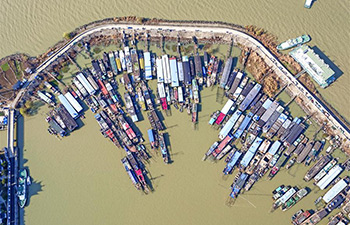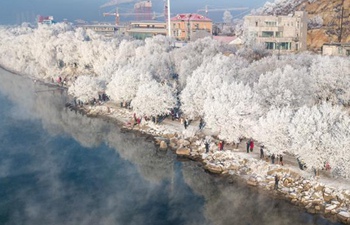
U.S. Secretary of State Mike Pompeo (R) and Greek Acting Foreign Minister George Katrougalos hold a joint press conference at the State Department in Washington D.C., the United States, on Dec. 13, 2018. In an apparent effort to hit Russia's energy exports to European nations, the United States on Thursday highlighted the role of Greece in the diversification of European energy sources, and mulled further boosting its energy cooperation with Greece in a bilateral dialogue. (Xinhua/Liu Jie)
WASHINGTON, Dec. 13 (Xinhua) -- In an apparent effort to hit Russia's energy exports to European nations, the United States on Thursday highlighted the role of Greece in the diversification of European energy sources, and mulled further boosting its energy cooperation with Greece in a bilateral dialogue.
U.S. Secretary of State Mike Pompeo and Greek Acting Foreign Minister George Katrougalos launched the inaugural U.S.-Greece Strategic Dialogue on Thursday at the State Department, and reaffirmed their commitment to deepen bilateral cooperation in key areas "for the mutual benefit of both countries," according to a statement issued by the State Department's deputy spokesperson Robert Palladino.
The department later released a joint statement regarding the dialogue, which also "included high-level interagency representation from both countries."
The joint statement emphasized Greece's role in European energy market, as the two governments "noted the need to improve Europe's energy security and diversification, highlighting the recent spot purchase of U.S. (LNG) liquefied natural gas and ongoing negotiations for a long-term supply agreement."
The United States "highlighted the increasing role of Greece as an energy, transport, and commercial hub in the region," and commended Greece's progress on energy projects to expand regional interconnectivity and supports additional infrastructure designed to diversify energy routes and supplies, the statement read.
The two sides also discussed cooperation on renewables and clean and efficient coal technologies, it said.
Besides energy cooperation, the two sides also discussed further collaboration in the Eastern Mediterranean and Balkans region, noting the need "to integrate the countries of the Western Balkans into European and transatlantic institutions."
The two nations also reaffirmed their commitment to further enhance the strategic defense and security partnership, and stressed the need to modernize and expand their multifaceted defense relationship.
U.S. Assistant Secretary for Energy Resources Frank Fannon on Monday urged European nations to abandon their cooperation with Russia on the Nord Stream 2 pipeline.
The Nord Stream 2 and an expanded Turkish Stream pipeline "are not commercial projects; they are political tools," the U.S. diplomat said, adding that "through Nord Stream 2 Russia seeks to increase its leverage of the West while severing Ukraine from Europe."
The U.S. Congress was reportedly considering taking actions in the coming days against the Nord Stream 2 pipeline, such as imposing sanctions against it. A vote on a non-binding resolution expressing opposition to the building of the pipeline was possible.
For his part, Russian energy giant Gazprom's chairman Viktor Zubkov said earlier this month that the construction of Nord Stream 2 pipeline had been proceeding as scheduled.
The Nord Stream 2 pipeline is the second gas pipeline that Russia sponsored to build to supply gas to Europe via the Baltic seabed, bypassing Ukraine, Belarus, Poland and other eastern European and Baltic countries.
The project is planned, constructed and subsequently operated by a joint venture called Nord Stream 2 AG which embraces Gazprom and five European companies.
The next dialogue between the United States and Greece will be held in Greece in 2019.











